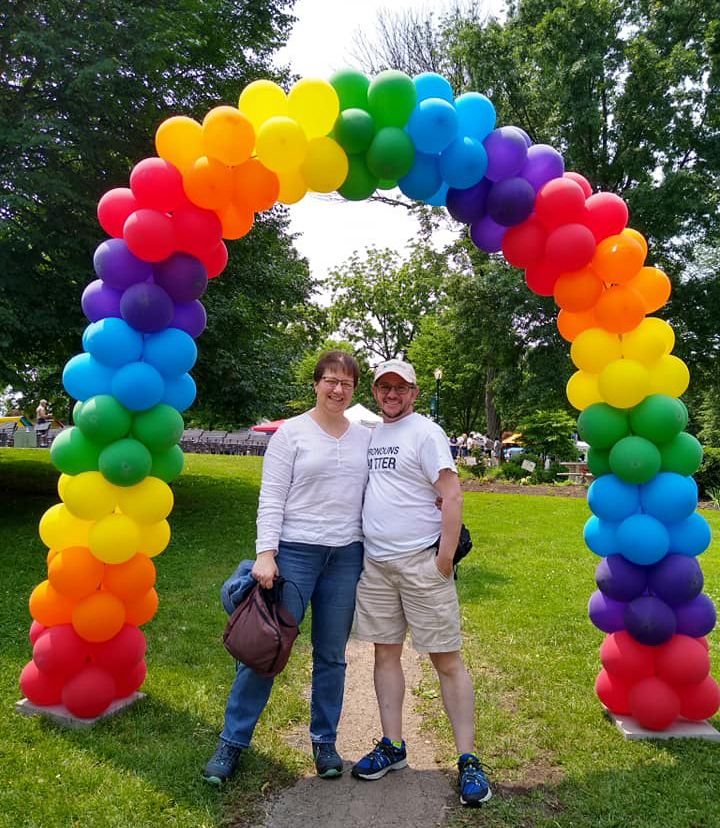Luchina Fisher, 54, filmmaker, Connecticut
Fisher and her husband, David Parr, have three children, Gia, 17, Luc, 15, and Mateo, 10. Gia came out as transgender at age 12.
It's really important to show pride, but also support. And what that support looks like is being both a vocal and a visible ally: showing up and speaking up. For our family, that means attending the Pride parades as a family.
Our first Pride parade as a family was in New York. It was the summer after Gia came out. We were decked out in beads and other things. The kids really had a great time.
Perhaps our favorite Pride parade was the one in which we all marched as a family. That was Chicago Pride in 2019. Gia is a founding member of the GenderCool Project a nonprofit organization that celebrates the successes and personalities of transgender youth instead of focusing on their gender identity. So the GenderCool champions were marching in the Pride parade and their families were right there with them. The love that you felt coming from the crowd, being in the crowd, we just all loved it.
This year, I don't know that there's any Pride in person. Everything is still virtual so we're plugging into events. I'm sure there's going to be some events around my film, Mama Gloria, a documentary about legendary transgender elder Gloria Allen, and Gia has a book coming out, A Kids Book About Being Transgender.
I think right now is such a critical time to show support for trans youth, especially because of all the anti-trans legislation you see coming out. All the bills that are being proposed at state legislatures that are banning everything from trans youth being able to participate in sports to being able to access their much-needed health care. Especially this year, it's important to show our support for the community.
Leslie Fisher, 57, diversity, equity and inclusion consultant, Oakland, California
Fisher is Luchina Fisher's sister and is married to Judy Gilbert.
Pride is a way to celebrate, to connect and bring visibility to a community that has been marginalized and threatened and killed. Now because of COVID-19, there's an opportunity to connect virtually with family, as well, who are celebrating on the other side of the country.
Our family represents. The rainbow bunting is up and we invite people over and play music. Every year we would normally go to some kind of celebration. We'd go to Castro [a San Francisco neighborhood] and we'd also go to downtown Oakland. We would be checking out parties. We might go to Zuni Café, which is like lesbian central near Market Street where all the celebrations are taking place. And it would be a total scene.
This year, it's going to be very different than how we usually celebrate. But I'm hoping that people can at least come over who have been vaccinated and we can have a get-together.
I'm used to having access to a Black Pride as well as a mainstream Pride. One year, we did a march of Black lesbians in Oakland during Pride Month, and it was fabulous.
I'm hoping with COVID, and with the fact that things are going to be streamed online, that people of color can also find resources in other parts of the country, even if they don't have something specific that supports Black lives and Black LGBTQIA [lesbian, gay, bisexual, transgender, queer, intersex, asexual.]
Heidi Kronenberg, 54, social worker, Hudson Valley, New York
Kronenberg lives with her partner and has two children who are young adults.
Pride means I don't have to be self-conscious about who I am. I can be out. I don't have to feel bad about myself or concerned about what people are going to think about me.
I used to live in Chicago so we used to go to the parade every year. Moving to a rural environment can be very challenging. The roots of my area are conservative. There's people that relocate here that are not conservative, but you never know who's around you. So I wouldn't put a rainbow flag in front of my house. My safety is always a concern.
The town next to mine has a little Pride parade. And it makes me feel really good. I wasn't sure what the climate was going to be, and if there would be protesters. But it was a whole parade. They had the school bands marching in it. I felt that was really embracing gay pride that they were letting everybody march. I felt super-embraced and very at peace and very happy to have moved here. I felt safe.
This year, my family will attend our local Pride parade. We like to feel that brief sense of security and support knowing that others have gathered to celebrate. My daughter now lives in New York City, so if there is a parade I'm sure she will go. My kids do little gestures — my son rearranged our dinner plates in rainbow order. Pride is a warm feeling, at least for the month.







































































More on Home and Family
The Future of LGBTQ Life and Advocacy for Older Adults
For the 'fierce' Stonewall generation, a new set of needs comes with ageLGBTQ Is a Growing Market for Travel Industry
Check out these gay-friendly resorts, cruises, camping spots and other destinations around the U.S.
AIDS Activists See Parallels in Coronavirus Pandemic
Lessons on resilience from two public health crises